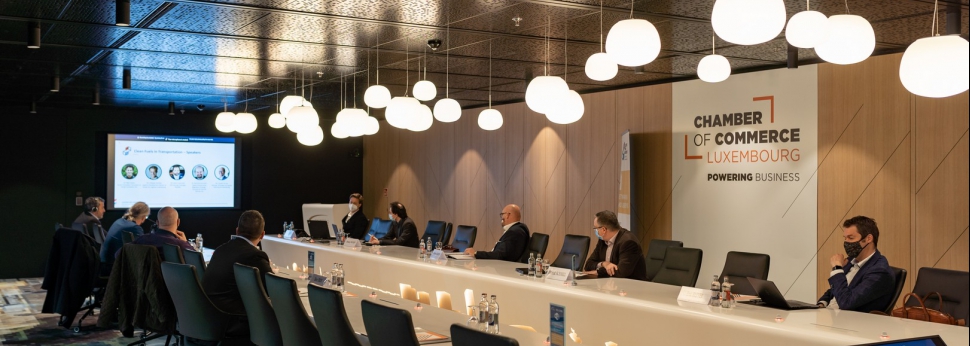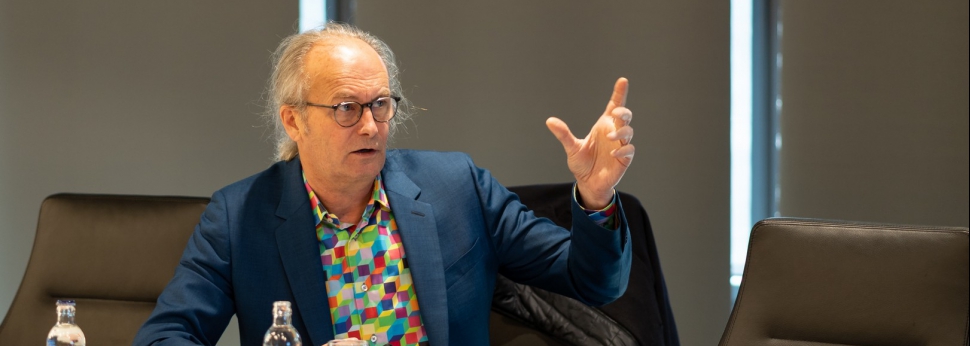Minister Turmes’ aggressive goals require large support for Clean fuels
How to make the transport sector more sustainable? Energy providers, transport companies and truck manufacturers are trying to test alternative fuels like hydrogen, biofuel or electricity as a viable option for road transport in long-haul and regional distribution. To advance this debate in Luxembourg, the Cluster for Logistics Luxembourg (C4L) organized, in partnership with Total Luxembourg, Hyundai Hydrogen Mobility and Daimler AG, and members a digital “Clean Fuels in Transportation” conference and debate on 25th March 2021 together with Minister of Energy Claude Turmes.
The conference, moderated by the director of the C4L, Malik Zeniti, attracted over 120 participants. It provided insights about the strengths, weaknesses and potential availability of alternative technologies that exist on the market, as well as on how technologies could be economically introduced in Luxembourg.
Carlo Thelen, Director General of the Luxembourg Chamber of Commerce, pointed out in his role of chairman of C4L, that this energy transition challenge cannot be carried by the companies alone: “The Cluster for Logistics wants to leave nobody behind, so we believe that Luxembourg needs to incentivize investments in state-of-the-art technologies through energy efficiency programmes for logistics and transport companies, if the government wants to “move the needle”. Reducing greenhouse gas emissions by enhancing efficiency also has a long-term positive financial effect, therefore the Chamber of Commerce proposes public investments in alternative refuelling infrastructures and incentives for acquisition in the national Hydrogen strategy. To achieve the EU green deal goals for 2030, sustainable projects for CO2 reduction programs need a roadmap for alternative fuels infrastructure and green energy based upon biofuels or alternatives produced by renewable energy, that are supported by governmental incentives to have an impact.”
Watch the Conference video
The C4L has been working on sustainability in transport since 2014 as part of the Green freight transport initiative, a challenge facing the sector. Philippe Scholten, in charge of the Lean and Green initiative in Luxembourg, highlighted that logistics companies currently rely mainly on optimization potentials in their efforts to save CO2, while economically acceptable technologies are still lacking. Against this background, the C4L shows a particular interest in encouraging an honest debate about alternative fuels.
Dr. Félix Urbain, Senior Innovation Consultant at Nordic Innovators P/S, explained the different origins of hydrogen and noted that Europe aims to exclusively rely on renewable generation options, for the transition. However, new technologies come at a price. The production cost of green hydrogen is estimated at 3,90 Euro per kilogram, currently 3-4 times that of Diesel. However, as Dr. Urbain expects demand for renewable H2 to increase manifold to 6,47 Mt in 2030, he believes that economies of scale across Europe should decrease costs.
In Europe, the use of hydrogen in transportation is still at the beginning. The most promising viable case just started in Switzerland. Hyundai and H2 Energy established ‘Hyundai Hydrogen Mobility’ to enter Europe’s hydrogen mobility ecosystem with fuel cell trucks, backed by a green hydrogen infrastructure. The first 25 trucks were delivered in 2020 to nine customers and Hyundai plans to deliver a total of 1,600 fuel cell heavy duty trucks served by 8 H2 fuel stations by 2025 and a vision of 500’000 trucks requiring 6.9 bn$ invest by 2030
While hydrogen is sometimes criticized for a low energy efficiency compared to battery solutions, Mark Freymüller, CEO of Hyundai Hydrogen Mobility, warned that “the efficiency considerations are purely academic and do not consider practical aspects like the cost per kilogram to get energy from A to B. Moreover, installing recharging infrastructure for several battery electric trucks is a huge challenge in cities and communes.”
There is no way around hydrogen, when talking about the energy transition. For long haul, hydrogen-powered trucks have an advantage over electric vehicles as they have a greater range with lower charging time and weight. Mr. Freymüller explained that the project was economically viable due to the relatively high Diesel price and the taxation structure in Switzerland. Emission-free vehicles do not need to pay the Heavy Vehicles tax (LSVA) which at 2.28 CHF/100tkm can sum up to 60.000 Euro per year for EURO6 Diesel-trucks.
Daimler AG is also working on offering alternative technologies in transportation, as Dr. Manfred Schuckert, Head of Automotive Regulatory Strategy - Commercial vehicles of Daimler AG explained. The automotive company is already offering different electric commercial vehicles and working on the GenH2 pre-series Truck for long hauls. A first hydrogen-driven truck is not expected before 2023.
Next to the trucks, the question of infrastructure was at the centre of the conference. A network of hydrogen stations needs a minimum number of cars or trucks to be viable as a capacity of 15 fuel cell trucks is equivalent to 700 H2 cars. Switzerland was able to solve this problem by collaborating to achieve enough trucks to make H2 refuel stations viable.
Luxembourg’s Minister of Energy and Spatial Planning Claude Turmes, presented the current government’s strategy on emission-free mobility and the necessary infrastructure. The national energy and climate plan of 2020(PNEC) foresees an aggressive reduction in greenhouse gas emissions by -55%, a national share of renewable energy of 25% and an energy efficiency improved by 44% by 2030. This plan clearly favours solutions such as electromobility, however also sees potential in hydrogen, especially in areas such as international freight transport where battery electric vehicles are currently not an affordable option. The minister expressed interest to exchange on plans and solutions that would be supported by the Luxembourg government dependent on further availability of technology that is not easy to predict today.
Round table discussion
An exchange of operational needs and perceptions from operators like Jürgen Helten for Luxport Group, Georges Eischen for La Provençale and Ben Frin for Arthur Welter Transport with Minister Turmes, and the 2 truck manufacturer representatives Mark Freymüller and Dr. Manfred Schuckert finalized the 16th Logistics conference organized by the C4L.The speakers noted that, even if ready to pay a bit more for emission-free trucks, the cost of current models were far too high to be economically viable. Some alternatives like Biodiesel that were briefly exempted from taxes were rendered impossible by European state aid rules, according to Mr. Turmes. European environmental policy is an important factor boosting new technologies and it is key for stakeholders to know, which ones will obtain funding and political support, the conclusion is that batteries and Fuel cells seem currently in the lead.
Currently there are no Hydrogen Trucks nor refuelling installations in Luxembourg so that without financial support from the government, it will be hardly possible to enable neither testing nor starting an energy transition in transport. The logistics sector companies therefore demand an incentive program rather than additional CO2 taxes in a competitive market. Minister Turmes expressed awareness for the need for support but couldn’t give any specifics about any incentive program.
Download the presentations of the speakers below










































































































































